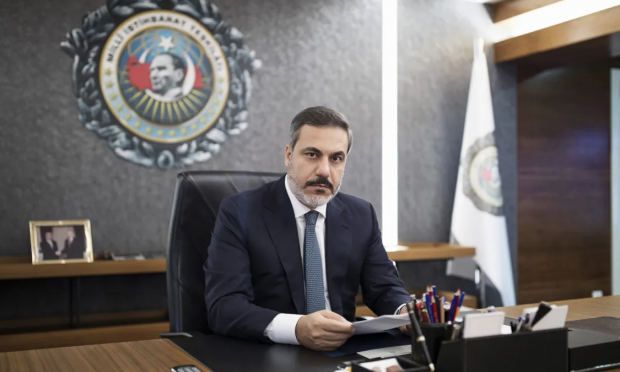One of the most significant transformations of the Turkish political system took place after the failed coup attempt on July 15, 2016. Turkey has successfully restructured its internal political system and redefined the responsibilities of many state institutions. Among other things, foreign policy factors were diverse. Many government institutions, such as the Turkish Cooperation and Coordination Agency (TIKA) and the Presidency of Turks Abroad and Related Communities (YTB), have begun to play effective roles in the field of foreign policy, Turkish analysts such as Muhitin Ataman point out.
However, the most significant change was made in the area of safety. The two inward-looking security actors, namely the Turkish Armed Forces (TSK) and the National Intelligence Organization (MIT), have experienced a large-scale transformation. Following the separation of internal security from external security, two security agencies under the Ministry of Defence, the General Gendarmerie Administration and the Coast Guard Administration are under the Ministry of the Interior, which is solely responsible for internal security. After Hakan Fidan became head of MIT, he restructured the institution and separated the internal from the external. Thus, the Turkish Armed Forces and the MIT became real actors of foreign policy, began to protect Turkey's national security from external threats, and consequently conducted effective (military) operations in various states against anti-Turkish organizations.
After the election of President Recep Tayyip Erdogan for the second time after the change of the presidential system, he appointed MIT head Hakan Fidan as the new foreign minister. Thus, Fidan became the chief diplomat of the first cabinet of the "Century of Turkey" vision. He is the first Secretary of State to come from a national intelligence and security establishment. As this is one of the most notable appointments of President Erdogan's new cabinet. Expectations from him in his new position are very high.
Fidan has been one of President Erdogan's key bureaucrats and aides throughout his administration since 2003, when Erdogan became the country's prime minister. He has held an important position in the Turkish bureaucracy since 2003. Fidan has had an illustrious career from non-commissioned officer to academic, from bureaucratic positions to MIT and finally to the Turkish Ministry of Foreign Affairs.
He first became head of TIKA, the main government institution providing humanitarian and development aid to needy states and communities worldwide, in 2003. He was then appointed Deputy Undersecretary to the Prime Minister in 2007 responsible for foreign policy and international security.
In this position he also served as a special representative of the Prime Minister. As the prime minister's special representative, he gained experience in various international crises and problem areas. He also specialized in counter-terrorism.
Finally, after being appointed deputy undersecretary at MIT in 2010 for procedural reasons, he was appointed head of MIT at the age of 42, becoming the youngest person to serve as head of Turkish intelligence. He held this position for 13 years.
Apart from his bureaucratic career, his academic career is also quite brilliant. Fidan graduated from the Ground Forces Combat School and the Ground Forces Language School. During his service in the Turkish Armed Forces, he received his bachelor's degree in political and administrative science from the University of Maryland, University College, United States.
Fidan then received his MA from Bilkent University with his thesis entitled "The Role of Intelligence in Foreign Policy" and his PhD with his thesis entitled "Diplomacy in the Information Age: The Use of Information Technologies in Verifying Treaties'. After completing his education, he conducted academic studies on international security, international development and Turkish foreign policy. He taught courses in the field of international relations at Hacettepe and Bilkent universities. He continued his academic studies at the IAEA in Vienna and the United Nations in Geneva.
The main focus of his academic studies was the role of intelligence in foreign policy. He stressed that Turkey should get rid of its dependence on other countries' intelligence and strengthen its intelligence for a stronger and more effective foreign policy.
In all these critical bureaucratic and academic positions, he was directly and indirectly involved in foreign affairs. In particular, after the failed coup attempt, thanks to the increase in humanitarian and technological intelligence capability, the MIT led by Fidan increased its capabilities and action to fight what Turkey considers terrorism in Syria and Iraq, as well as in the country and ultimately increased its effectiveness in the international arena. Fidan has taken part in almost all of President Erdogan's foreign visits. He has worked closely with two other foreign ministers, former Foreign Minister Mevlut Cavusoglu and former Defense Minister Hulusi Akar. As such, Fidan was already part of the foreign policy and national security apparatuses.
Fidan and MIT played an important role in normalizing Turkey's relations with the regional countries of the Middle East. The first phase of the dialogue was carried out and brought to a certain stage by MIT and Fidan and then the process was left to the Ministry of Foreign Affairs. For example, he has also represented Turkey in the normalization process with Syria.
Taking all these experiences and personal accounts, it is clear that Hakan Fidan is already a skilled and experienced diplomat. In his new position as the country's chief diplomat, he will deal with the issues he used to deal with behind the curtains, in front of the stage. Serving as Turkey's chief diplomat, he has no shortcomings but he has advantages. One can easily claim that it can represent all three types of power in international relations, namely hard, soft and smart power.



